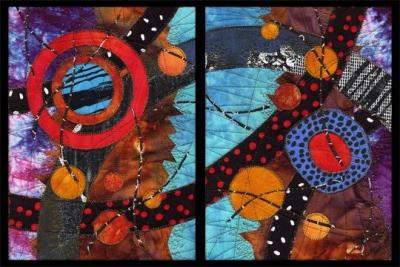
When we talk about boundaries, the first thing that comes to mind is often the overstepping boundaries by excessive control. We may remember mom who makes us eat spinach and does not let us leave the table until we have eaten it all; the teacher who kicks us out of the classroom; children who poke fun of us or a tougher boy who pulls our hair or steals a ball on the street. There is a presence and power that imposes itself and oversteps the boundaries by cornering us physically, emotionally or verbally.
But have you ever thought about how the lack of presence of someone significant while growing up can affect our boundaries and break them? Yes, there is the other side of the coin - when power is imposed through absence and unavailability.
This kind of situation also has a profound effect on the boundaries of the human being which is growing up. In addition to the fact that such behavior sends us a message that we are not important, so self-confidence is ruined, boundaries cannot be defined - in some way they remain undrawn and weakened. Because, in order to feel ourselves, we need that someone else. When a child can go from one parent to the other, between them, both in play and in other circumstances of life and growing up, it naturally feels the boundary, the place where it arrives either on one side or the other - and all that gives a feeling and a definition of the self. When we do not grow up with both parents, that dynamic is not formed and our sense of self and boundaries remains undefined and confusing. One part of us remains there, and the other part becomes displaced, stretched into an endless longing for that other person whom we cannot possibly persuade to be with us. This scenario can be the basis for excessive codependence in partner relationships later in life. Because, once we manage, in that sea of emptiness, to touch someone, whether it's a healthy or unhealthy contact, we don't let them go for anything in the world. Then we often overstep our boundary again for the sake of contact. But that's a long story for another essay.

An overly corrected child, a rigid character structure, kind of grew up in an ambivalent mix of excessive control and absence that is imposed if the will of the controller is not fulfilled. Everything that a child is - restless, lively, noisy in this kind of environment had to be controlled, to quiet down to the level which such an environment could tolerate. What I want to say is that our care takers silenced their eros, their life force, stifled it, for various reasons, and that the vitality of others had to be brought under control as well. That rule was sometimes verbalized, and sometimes not - it would be suspended in the air and implied - unwritten and unspoken.
Such atmosphere is hard and creates a shell around a person, especially in the area of the throat and the fifth chakra. Spontaneity is not allowed, and along the way a threat is attached to it, so it becomes dangerous. Because, spontaneity is unpredictable, it brings grace to life, it brings excitement. But that was not welcomed only was what was planned, known, organized was allowed. Flexibility is lost, a person slowly dries up. Anxiety grows because we do not know what we may encounter around us, whether our behavior would be accepted or condemned. That's why we stay in a rigid capsule that protects us from uneasiness and potential mistakes. That's why this structure leaves to others to define the boundaries, to tell the steps that should be followed so as not to cause disturbance in the house and to avoid overstepping other people's boundaries, which are also rigid. As you could probably feel, there is not much flow and feeling here, not much oscillation. There is a firm distance. Everything is flat and it is the best that it stays that way. In case we go against unwritten laws, or the spoken ones, we get the punishment, which is often a complete disregard of our existence and a silent treatment.
In such a structure, a person loses contact with his truth, with his core and what he really is. We move under a mask, to the periphery and diligently perform the tasks on the kilometer-long list.
When a tree lacks flexibility, most often it breaks under the gusts of wind and hurricanes. Self-doubt and one's own adequacy begins to break this rigidity with an increased dose of anxiety, because we are simply not sure.... To keep the anxiety under control, we resort, once again, to rigid rules and boundaries. And it’s an endless cycle.
A Moral
Through these essays on the subject of borders, similar themes run through all character structures. So, let's review:
- a sense of self is necessary to define boundaries
- needs are a significant factor that affects the formation of boundaries
- the internal boundaries between the aspects of our own personality are reflected in our boundaries that are formed in relation to other people and the world in general
- our defense system mainly sets our boundaries and their dynamics
- the defense system, or character structure, was built with the purpose of protecting the wound or trauma that occurred in the very early days of the human being’s development (prenatal until adolescence)
- since such boundaries are formed in accordance with the pain we bear, they are often not of a great benefit to the creative process and the life we long for
- redefining boundaries after addressing the pain we carry inside us after being hurt is necessary if we aim to establish somewhat healthy relationships in our lives
- boundaries are the final product, the external manifestation of the relationship to oneself

Potential solutions and consequences of establishing the boundaries
There are several essential values, or factors, that are necessary in order to establish healthy boundaries.
One of them is respect. When there is respect for human life (which is eroding at high speed in today's world), there is also an interest in the individual and her needs, as well as the recognition of her decisions and will. Respect for others would hardly exist if we didn’t have respect for the life that lives within us. As usual, the effort starts from within.
When there is respect for another person with different habits and ways of thinking, different values, communication is the next indispensable portion of setting boundaries. There is no human being whose purpose is to spend the life figuring me out – it is mine to communicate what bothers me, what is acceptable and what is not. We come back to ourselves again - if we are unable to do something like that, we cannot blame others for treating us the way they do. All the souls we meet on our earthly journey are our teachers - not only those who are spiritual in love and light, but also those who have perhaps hurt us the worst. They mercilessly remind us why we are here and do not let us forget a task, maybe the most important one, that we came here to do and which is often becoming aware of some part of ourselves (from insignificant to important one, from unaccepted to loved). It all starts with changing your attitude towards yourself. As much as we can hear parts of ourselves and various internal needs, so will we be able to transfer this ability to the outside world and hear and see the other, respect their boundaries, as well as our own.
Honesty, openness, vulnerability, sensitivity...all these qualities contribute to clear and flexible boundaries, but it is not always easy to apply them in practice. Sometimes, when we have shown these qualities, people took advantage of the opportunity and of us. And we return again to the deep work on ourselves - honesty towards ourselves, sensitivity towards our own needs.
Sometimes, when we gather the strength to stand up for ourselves, for our boundaries and the truth, we don't always feel good about ourselves. We doubt ourselves, whether we did or said something wrong, whether the consequences for the other person are significant, whether, whether... it comes down again to that "something is wrong with me. I better shut up."
And sometimes, when we express our need to change our attitude and boundaries, the other side does not react and does not hear us. In fact, they even have no intention of changing and moving their attitude and boundaries. Then comes the moment for our assessment and willingness to let go of something and maybe someone. There is a difficult dilemma within us: me or that someone else? And it's even harder when it's about someone who is very close.
It may happen that the other party reacts to us as if we were actually predators, and not victims of a conflict. This again suggests that something is wrong with me, that I may have made a mistake. We then need the help of a therapist or good friends in order to return to the purity of our intentions and actions.
And finally, let us be prepared for loss when setting boundaries. Sometimes it will not suit some people. And that's just the way it is. We cannot force anyone to have a relationship and closeness with us. We are all at different places on the life map of development and awareness. Some people will end their relationship with us and leave because the new boundaries we draw simply do not suit them. Let us be ready to let go, to grieve, but also to strengthen our respect for ourselves.
In the end, we can say that boundaries are a reflection of our awareness, our relationship with ourselves and our soul. I can't help but remember Barbara Brennan in one of her lectures when she said: At the beginning of education in this school, we taught you about boundaries and grounding, and now, at the core level, and at the end of education, we tell you that boundaries do not exist and that you ground into your core.
No matter how we look at it, personal transformation awaits us.
May understanding, compassion, peace and acceptance accompany us on this journey.


Add new comment